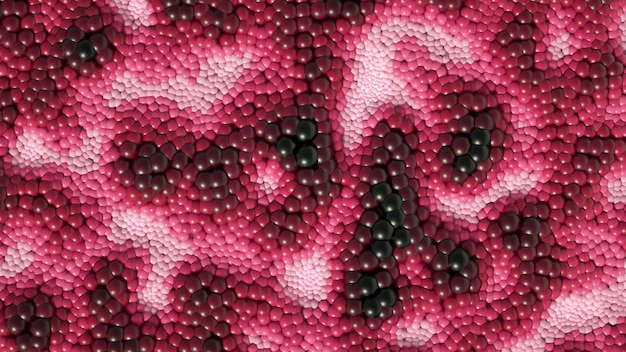The Science of Scent: Understanding Perfume and Your Skin’s Chemistry

The science of scent explores how perfume interacts with your skin’s unique chemistry, influencing fragrance perception through factors like pH levels, skin hydration, and individual body odors, creating a personalized olfactory experience that differs from person to person.
Ever wondered why a perfume smells amazing on your friend but not quite the same on you? The secret lies in the fascinating science of scent: how perfume interacts with your skin’s chemistry.
The Olfactory Symphony: An Introduction to Perfume Chemistry
Perfume is more than just a pleasant smell; it’s a complex blend of various aromatic compounds that create a unique olfactory experience. Understanding the basics of perfume chemistry is the first step in appreciating how it interacts with your skin.
Each perfume is composed of top, middle, and base notes, which evaporate at different rates, creating a scent journey that evolves over time. These notes are derived from natural and synthetic sources, each contributing to the overall character of the fragrance.
The Role of Aromatic Compounds
Aromatic compounds, also known as odorants, are the key components that give perfumes their scent. These compounds can range from volatile esters to more complex molecules derived from plants, animals, or synthesized in a lab.
Understanding Top, Middle, and Base Notes
The composition of a perfume is often described in terms of its ‘notes’: top notes, which are perceived immediately upon application; middle (‘heart’) notes, which emerge as the top notes dissipate; and base notes, which linger the longest, providing a foundation for the fragrance.
- Top Notes: These are light, fresh, and usually the first impression of a perfume, lasting for about 15 minutes to 2 hours.
- Middle Notes: Also known as heart notes, they emerge as the top notes fade and last for about 3-5 hours, forming the core of the fragrance.
- Base Notes: These are rich, heavy, and the foundation of the perfume, providing depth and lasting for 5-10 hours or even longer.
In conclusion, perfume chemistry involves a complex interplay of aromatic compounds and their evaporation rates, creating a layered scent experience that is both art and science.
Your Unique Skin Microbiome: The Unseen Influence
Beyond the chemical composition of perfume, your skin’s unique microbiome plays a significant role in how a fragrance smells on you. These microorganisms interact with perfume molecules, altering the scent profile.
The skin microbiome is a complex ecosystem of bacteria, fungi, and viruses that live on the surface of your skin. The composition of this microbiome varies from person to person, influenced by factors like genetics, environment, and lifestyle.
How Bacteria Affect Scent
Bacteria on your skin can metabolize perfume molecules, breaking them down into different compounds that can change the overall scent. This process can enhance certain notes or even create entirely new scents.
The Impact of Skin Flora
Different types of skin flora can react differently with the same perfume. This means that the same fragrance can smell slightly different on two people due to variations in their skin’s microbial composition.

- Personalized Scent: Your unique microbiome contributes to a personalized scent that is truly your own.
- Changing Scent Profile: The interaction between perfume and skin flora can cause the scent profile to evolve and change over time.
- Environmental Factors: Factors like temperature and humidity can also affect the skin microbiome and, consequently, the scent of your perfume.
In summary, the skin microbiome adds another layer of complexity to the science of scent, influencing how a perfume smells and evolves on your skin, making each fragrance experience unique.
pH Levels: The Acidity Factor in Fragrance Perception
The pH level of your skin, which measures its acidity, can also affect how a perfume interacts with your body. A balanced pH is essential for maintaining the skin’s barrier function and can influence the longevity and scent of a fragrance.
Skin pH typically falls between 4.5 and 5.5, making it slightly acidic. This acidity is crucial for protecting the skin from harmful bacteria and maintaining its overall health.
The Role of Acidity
The acidity of your skin can affect the stability and volatility of perfume molecules. More acidic skin may cause certain notes to evaporate faster, while less acidic skin may prolong the scent.
Maintaining Balanced Skin pH
Factors like skincare products, diet, and even stress can affect your skin’s pH levels. Maintaining a balanced pH can help ensure that your perfume smells its best and lasts longer.
Different pH levels on the skin can alter how certain perfume notes are perceived. For instance, a lower (more acidic) pH might cause citrus notes to become more pronounced, while a higher pH could emphasize woody or musky undertones.
- Impact on Longevity: Skin pH can affect how long a perfume lasts, with balanced pH promoting longer wear.
- Influence on Scent Notes: Acidity levels can change the prominence of different scent notes, altering the overall fragrance profile.
- Skincare Routines: Using pH-balanced skincare products can help maintain optimal conditions for perfume interaction.
In essence, understanding skin pH is crucial for predicting how a perfume will behave on your skin, ensuring you get the most out of your fragrance.
Skin Hydration: The Moisture’s Impact on Scent
Hydrated skin holds onto fragrance better than dry skin. Moisture helps to trap perfume molecules, allowing them to release their scent more slowly and evenly throughout the day.
When skin is well-hydrated, its surface is smoother and more receptive to fragrance. This allows perfume molecules to adhere better, resulting in a longer-lasting scent.
The Effects of Dry Skin
Dry skin tends to absorb perfume quickly, but it also releases the scent faster, leading to shorter wear time. This is because the skin lacks the moisture to hold onto the fragrance molecules.
Tips for Hydrating Your Skin
To enhance the longevity of your perfume, keep your skin well-hydrated by drinking plenty of water, using moisturizers, and applying perfume after showering when your skin is still damp.

Hydrated skin provides a better canvas for perfumes by allowing the fragrance molecules to properly bind and slowly evaporate, providing a sustained and consistent scent.
- Longer-Lasting Scent: Hydrated skin helps perfume last longer by trapping fragrance molecules.
- Improved Scent Projection: Well-moisturized skin allows for a more even and consistent release of fragrance.
- Application Tips: Apply perfume after moisturizing to lock in the scent and enhance longevity.
In summary, skin hydration is a key factor in how well a perfume performs, making it essential to moisturize your skin to maximize your fragrance experience.
Diet and Lifestyle: Subtle Scent Modifiers
What you eat and how you live can subtly influence your body odor, which in turn affects how a perfume smells on you. Diet and lifestyle choices can alter your skin’s natural scent, creating a unique interaction with your chosen fragrance.
Certain foods, like garlic, onions, and spicy dishes, can release compounds that are excreted through your sweat glands, affecting your natural scent. Similarly, lifestyle factors like smoking or excessive alcohol consumption can also alter body odor.
The Impact of Dietary Choices
The food you consume can influence the chemical composition of your sweat and sebum, which can affect the scent of a perfume. A diet rich in fresh fruits and vegetables may promote a cleaner, more neutral scent, while a diet high in processed foods may have the opposite effect.
Lifestyle and Scent
Lifestyle factors like exercise, stress, and sleep habits can also impact your body odor. Regular exercise can help detoxify the body, while stress and lack of sleep can lead to increased sweat production and altered scent profiles.
Your diet and lifestyle choices can influence your body odor, which then subtly modifies the way perfume interacts with your skin, leading to a personalized scent experience.
- Dietary Influence: Foods like garlic and onions can alter your natural scent, affecting how perfume smells.
- Lifestyle Choices: Smoking, alcohol, and stress can impact body odor and perfume interaction.
- Holistic Approach: A healthy diet and lifestyle can enhance your natural scent and improve how perfume smells on you.
In essence, adopting a healthy diet and lifestyle can positively influence your body odor, enhancing the way perfume interacts with your skin and creating a more pleasing and personalized scent.
The Emotional Connection: Scent, Memory, and You
Scent is closely linked to memory and emotions, making the experience of wearing perfume deeply personal and subjective. The same fragrance can evoke different memories and emotions in different people, creating a unique olfactory journey.
The olfactory bulb, which processes scents, is directly connected to the amygdala and hippocampus, brain regions responsible for emotions and memory. This direct connection explains why scents can trigger powerful emotional responses and vivid memories.
Scent and Memory
Scents can transport you back to specific moments in time, evoking memories and feelings associated with those experiences. This is why a particular perfume might remind you of a loved one or a special event.
The Power of Personal Association
The emotional connection to a scent is highly personal. What smells comforting and nostalgic to one person might evoke completely different feelings in someone else, due to varying life experiences and associations.
Perfumes evoke personal memories and emotions, making the scent experience subjective and unique to each individual. What resonates with one person may not necessarily resonate with another.
- Nostalgic Scents: Perfumes can trigger memories and emotions linked to past experiences.
- Personal Connection: The emotional association with a scent is highly individual and subjective.
- Therapeutic Potential: Scents can be used to evoke positive emotions and enhance well-being.
In summary, the emotional connection to scent adds a profound layer to the science of perfume, highlighting the deeply personal and subjective nature of fragrance and its ability to evoke memories and emotions.
| Key Factor | Brief Description |
|---|---|
| 🔬 Skin Microbiome | Skin’s unique microbial composition alters perfume scent. |
| ⚖️ pH Levels | Skin’s acidity influences perfume volatility and longevity. |
| 💧 Skin Hydration | Moisturized skin retains perfume scents longer. |
| 🍎 Diet & Lifestyle | Diet and habits modify body odor, affecting perfume’s scent |
Frequently Asked Questions
▼
Perfume interacts with your skin’s unique chemistry, including pH levels, skin microbiome, and hydration levels, leading to a personalized scent experience that varies from person to person.
▼
Hydrated skin retains perfume molecules better than dry skin, allowing the fragrance to release its scent more slowly and evenly, resulting in a longer-lasting aroma.
▼
Yes, certain foods like garlic and onions can release compounds excreted through sweat, affecting your natural scent and influencing how perfume interacts with your skin.
▼
The skin microbiome consists of bacteria that can metabolize perfume molecules, changing the overall scent profile. Variations in microbial composition lead to unique fragrance experiences.
▼
Skin pH affects the stability and volatility of perfume molecules. Balanced skin pH ensures perfume lasts longer and different scent notes are perceived more accurately.
Conclusion
Exploring the science of scent: how perfume interacts with your skin’s chemistry reveals that fragrance is a deeply personal experience influenced by a multitude of factors. From your unique skin microbiome and pH levels to hydration, diet, and emotional connections, each element contributes to the distinctive way a perfume smells on you. Understanding these interactions allows you to make more informed choices, ensuring your chosen fragrance truly complements your individual essence.





